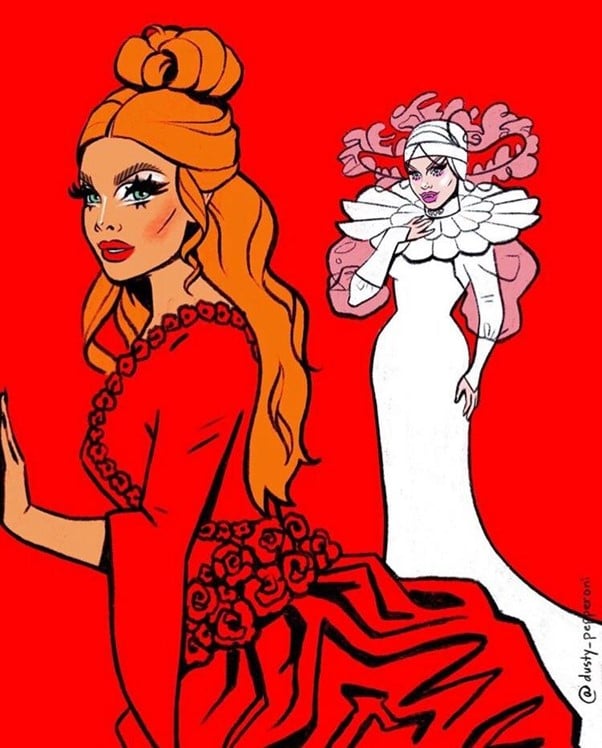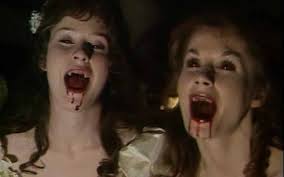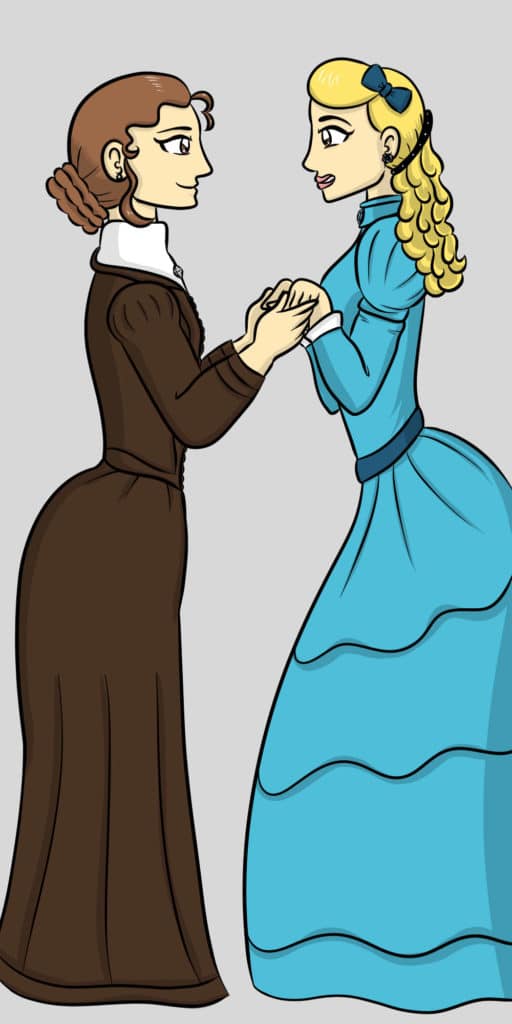The Suppressed Letter in Dracula
Lucy, Mina and Unreliability
In Richard Martin‘s latest supplement to his A level English Literature teaching, he considers the possibility in Dracula, of Mina having suppressed a letter and explores why she might have done so.

Valentina and Farrah as Mina and Lucy from Bram Stoker’s Dracula, Illustrated by @dusty_pepperoni
The Gothic genre promotes narrative strategies in general which encourage readers to trust narrators. They may of course be slower than the reader to embrace the uncanny but that in itself confers reliability upon them: Stoker’s stolid narrators, Jonathan Harker and John Seward are quintessential examples. To a great extent, unreliable, narrative is fatal to the form. It is true that a novella (The Turn of the Screw) written a year later than Dracula by ‘the master’, Henry James makes use of unreliability but in the name of literary subversion. The unnamed governess who assumes that a dead governess, Miss Jessel and footman, Peter Quint are abusing her charges stands herself charged at the end of the novella (so far as the reader is concerned) with child abuse: as a consequence of her insistence that the children are communing with the dead, she swells the latter’s numbers. Miles (spoiler alert) dies of a cardiac arrest.
With the assumption in mind that gothic narratives are reliable, it is easy to miss the fact that early in Dracula (1897) there is evidence of Mina’s suppression of a letter she wrote to her friend Lucy. The former initiates correspondence on the 9th of May. Lucy responds in a letter undated – a reminder of the fact that she is much less methodical than her friend. Paradoxically, further evidence of her greater erraticism comes from the fact that she does date her second letter written on the 24th of the same month. This letter begins with typical effusiveness on the part of Lucy: ‘Thanks and thanks and thanks again’. Lucy’s passionate nature is expressed a little later in terms of the triplet form she uses here, when she wonders why a woman cannot marry three men. Here, she is thanking Mina for a letter – to which the reader has no access – in which her friend displayed ‘sympathy’. Now sympathy has a broader meaning in the 19th century (perhaps because the word ‘empathy’ had yet to be coined) and it could simply mean that Mina was able to echo the sentiments Lucy expresses again in triplet form at the end of her letter:
I love him. I am blushing as I write, for although I think he loves me, he has not told me so in words. But oh, Mina, I love him; I love him; I love him!
It would be easy for Mina to do this given that she is affianced herself. But if her letter simply expresses her duplication of her friend’s feelings it is difficult to explain why the reader is not privy to it. What is the precise object of Mina’s sympathy? Did Mina commiserate with Lucy on the over-bearing nature of Mrs. Westenra? Mina is given no parents in the novel – we assume her orphan status and she makes her journey to Budapest unaccompanied – and in any case her middle-class identity enables a greater possibility of a love match being achieved. I discuss below a subsequent letter Mina writes in which she presses the claims of duty. Does the suppressed letter offer an antithetical view? Is that why it is suppressed? Characters in this novel (specifically Mina and Lucy) are prone to oscillating between orthodox and heterodox perspectives.
It is also difficult to explain why Lucy (if Mina was simply identifying the synchronous nature of their feelings for their respective partners) should continue her letter using an idiom which is only ever used when a succession of negative events afflicts an individual: ‘it never rains but it pours’. If the reader attempts to re-construct Lucy’s thought process from her letter it might appear that Mina sympathised, in the sense of commiserated, with Lucy since she goes on to refer to events conceived by her as unfortunate. On the face of it, the fact that Lucy is the recipient of three marriage proposals in one day ought to be a cause for celebration. But for Lucy it is perhaps less the number of proposals as the necessity of disappointing two – and perhaps herself – by her need to choose one. And Lucy’s choice is not a free one because it is clear that her mother is backing the interests of Arthur, the soon to be Lord Godalming, over those of the American adventurer, Quincey and the middle-class professional, Seward, whose managership of a lunatic asylum aged 29 is impressive but offers no contest against the claims of the only son of ailing aristocrat. Indeed, it is difficult to square the effusiveness with which Lucy declares her love for Arthur and the rather barbed remark she makes in the same letter, in which she notes:
That was Mr. Holmwood. He often comes to see us, and he and mamma get on very well together; they have so many things to talk about in common.
Clive Leatherdale claims that Lucy’s rebellious streak is reflected in her accepting of this proposal, but there is nothing rebellious about her marrying into the aristocracy: Lucy’s remarks about how well Arthur and Mrs Westenra ‘get on’ tells its own story of a middle-class mother’s social aspirations and the way she has espied a means by which they can be imminently realised. The effusiveness with which she ends her letter to Lucy might of course represent a case of her protesting too much: does she need to talk herself into a delusion of volition? On the face of it, this is the only way of resolving the contradiction in the letter by which Arthur is initially presented as being of greater interest to Lucy’s mother and then identified as the object of intense passion on the part of Lucy herself. The only other solution is that Lucy isn’t talking about Arthur here at all. An interesting thought? The only evidence that she is doing so surfaces in a rather dispassionate remark made about Arthur earlier in the paragraph ending so effusively. This remark far from centralising Arthur focuses instead on her frustrations both with that which young women might be assumed to be interested and the restrictions which forbid expressing her antipathy in a demotic way:
‘Dress is a bore. That is slang again, but never mind; Arthur says that every day.’
Lucy is often identified by critics such as Wolf and Leatherdale as being rather empty-headed but her lack of interest here in fashion suggests a depth, a rejection of the superficial, for which she is not being given credit. It is only the allusion to Arthur here that encourages the reader to identify him as the object of her passion later in the paragraph, but what he excites in her at this point of the letter is not so much passion as instead a rather cool estimation of the lexical latitude men enjoy relative to women. Like the first Cathy in Wuthering Heights (1847) Lucy finds herself in a Jane Austen ‘marriage-plot but unlike Austen’s heroines who obtain the best of both worlds from marriage, the plot in this instance is closer to a conspiracy and results in an entrapment. We might claim a closer relation between Bronte and Stoker’s novels than has often been acknowledged and identify Arthur with Edgar Linton and Dracula with Heathcliff, the demonic lover, the perennial outsider, the incubus.
Lucy’s relative indifference to Arthur is notable elsewhere in her letter detailing her three proposals. It would surely be more obvious to relegate the two rejected suitors to a postscript given their surplus to requirements status but instead Quincey and Seward receive much greater coverage in the body of the letter. Lucy treats Arthur’s proposal as a fait accompli – and what has been accomplished is another’s doing. Refusing Arthur is not feasible, but it is surely the case that Lucy shows greater volition by agreeing to kiss Quincey than she does here being grabbed and possessed by Arthur:
P.S.—Oh, about number Three—I needn’t tell you of number Three, need I? Besides, it was all so confused; it seemed only a moment from his coming into the room till both his arms were round me, and he was kissing me. I am very, very happy, and I don’t know what I have done to deserve it. I must only try in the future to show that I am not ungrateful to God for all His goodness to me in sending to me such a lover, such a husband, and such a friend.
Lucy isn’t given the time to think in this hurried sequence as Arthur acts both precipitately and proprietorially. What is a fait accompli for Lucy is for him a foregone conclusion. I surmise that Lucy’s mother has made it clear to both young people at different times that this proposal is not to be refused. Lucy’s fear of displaying future ‘ingratitude’ is as notable (and jars with) her claim to happiness and there is the renewed triplet effect with which the postscript ends. It is as though Lucy can only reconcile herself to monogamy by trying to see Arthur in multiple forms – as at once the husband but also the lover (Quincey who claims a kiss?) and the friend (Seward).
Lucy goes on in another letter dated 30th of August to consign the announcement of her wedding to a P.P.S. This might be understood as reflecting her desire to marginalise to an even greater degree that which – as her wedding day grows nearer – is more and more central to her life. The same letter marginalises Arthur even in the body of the missive:
By the way, I forgot to tell you that Arthur is here. We have such walks and drives, and rides, and rowing, and tennis, and fishing together; and I love him more than ever.
The conflict between the casual opening of the first sentence and the passionate assertion with which the second ends is striking and by no means uncharacteristic. And in the middle of it all is Lucy’s rather lack-lustre account of the activities upon which she and Arthur are embarking as a taste of their married life together. Lucy cannot muster a single positive adjective to tell Mina how she feels about these components of her life with Arthur. But maybe that, in itself, tells the reader all they need to know.
Lucy’s somnambulism is first alluded to by Mina in her journal for the 25th of July. Her sleepwalking is not simply around the house but out of it and I read this as representative of her resistance to the role for which Victorian society has prepared her as the angel in the house – to quote the title of Coventry Patmore’s now notorious poem of 1854 which narrows femininity to wifehood. Stoker’s master-stroke is to parallel the experiences of Jonathan at Castle Dracula with Lucy in the Victorian home. Both characters search for the key that will enable them to escape from their incarceration. But there is a difference because for Jonathan, Dracula is in possession of the keys whereas for Lucy he is the key. The novel contains a series of locations from which characters desire escape: Jonathan from Castle Dracula; Lucy from the Victorian household; Renfield from the lunatic asylum and Bersicker from London Zoo. Strikingly all but the first of these instances is in some way encouraged by Dracula. Dracula is thus more often the agent of freedom than he is of incarceration. Make of that what you will.
Mina is at one point of the narrative in two minds about including (in the document she is responsible for collating) a section of her journal in which she comes into intimate contact with Arthur. The more obvious reading of this sequence is, I suppose, that it confirms Mina’s reliability, and that which occurred, is in any case, was innocent. It is certainly true that she defers to Van Helsing’s judgement rather than exercising her own.
Mrs. Harker began to blush, and taking a paper from her pockets, she said:—
“Dr. Van Helsing, will you read this, and tell me if it must go in. It is my record of to-day. I too have seen the need of putting down at present everything, however trivial; but there is little in this except what is personal. Must it go in?”

The ambiguity here is as to whether she fears the misconstruction that could be put on the sequence she details or whether she fears that the interpretation others might reach accords with the reality of it. The ‘blush’ doesn’t help the reader entirely since it might be occasioned by either of the two alternatives just identified: blushing signifies innocence or guilt. So far as the reader is concerned, Mina’s anxiety parallels that of her now husband Jonathan Harker who is in two minds about including his encounter with the Vampire Brides:
I felt in my heart a wicked, burning desire that they would kiss me with those red lips. It is not good to note this down, lest some day it should meet Mina’s eyes and cause her pain; but it is the truth.
It would be possible to read the two sequences as antithetical – Harker displays an interest in polyamory but Mina (to take her at her own estimation) has merely displayed a maternal love for the grieving Arthur. It is more obvious, however, to parallel the two sequences and to note that the novel’s two heterosexual monogamists are also identified with a latent interest in the homosexual and the polyamorous. Jonathan and Mina are the best examples the novel offers us as to the extent to which our conscious, social selves represent the tip of a very expansive and submerged iceberg. Mina’s blush (which accompanies her query to Van Helsing as to whether this section of the journal needs inclusion) and the curious value she places on being addressed by Arthur in the same way as he addressed Lucy (‘little girl’) could both suggest that the reader is not being overly suspicious here.
Van Helsing’s insistence that the section detailing Mina’s encounter with Arthur must be included in the evolving document is based on the claim that:
I am told, Madam Mina, by my friend John that you and your husband have put up in exact order all things that have been, up to this moment.
But this is not absolutely the case and this returns to the letter Mina must have written to Lucy sometime between the 9th (the date of Mina’s first letter to Lucy) and the 24th of May (the date of Lucy’s second letter to Mina). It is stimulating to consider Jonathan’s experiences at this time since we have to acknowledge that his uncanny experiences take place in the same timeframe as those in which Mina and Lucy are writing to one another, though we read them serially. Mid-way between these two dates (16th of May) Jonathan has an encounter with the Vampire Brides that proves his polyamorous capacity; a week later Lucy queries monogamy:
Why can’t they let a girl marry three men, or as many as want her, and save all this trouble? But this is heresy, and I must not say it.
I simply wish to identify the suggestiveness of the contiguity between Jonathan’s experience and Lucy’s heretical question. But I do wonder about the contents of Mina’s letter to Lucy in this same timeframe and ponder whether it is suppressed for the same reasons as another to Lucy is included. I refer to her letter to Lucy dated the 24th of August and sent from the convent where Jonathan is convalescing after his conveyancing has taken an unexpected turn for the worst:
Lucy dear, do you know why I tell you all this? It is not only because it is all sweet to me, but because you have been, and are, very dear to me. It was my privilege to be your friend and guide when you came from the schoolroom to prepare for the world of life. I want you to see now, and with the eyes of a very happy wife, whither duty has led me; so that in your own married life you too may be all happy as I am. My dear, please Almighty God, your life may be all it promises: a long day of sunshine, with no harsh wind, no forgetting duty, no distrust. I must not wish you no pain, for that can never be; but I do hope you will be always as happy as I am now. Good-bye, my dear. I shall post this at once, and, perhaps, write you very soon again. I must stop, for Jonathan is waking—I must attend to my husband!

This cartoonish depiction of Mina and Lucy nonetheless conveys the consensus view of the difference between Mina and Lucy. The truth is more complex.
The word ‘duty’ features 40 times in the novel and 3 of its usages appear in Mina’s letter to Lucy. The bland piety of this letter has not led to it meriting much critical discussion, but I want to suggest that it in we may discover a thread of a conversation that has developed between Mina and Lucy about marriage, duty and faith over the previous weeks. What does Mina mean by wanting Lucy ‘to see now…whither duty has led me’. Does the adverb imply a prior position outlined in the suppressed letter? Leatherdale surmises that Lucy might well have been one of Mina’s charges, given that she identifies herself as a teacher of ‘etiquette and decorum’. If that is the case, she here resumes her pedagogic role in the life of Lucy – much like Van Helsing does in the life of Seward during the course of the novel. If the letter is apropos of nothing, it all appears rather heavy-handed but if its concluding remarks are understood to be part of a debate between Mina and Lucy something becomes abundantly clear. Happiness, according to Mina, resides in adhering to duty and ‘forgetting duty’ is akin to a disruptive ‘harsh wind’ that threatens to tear a married couple apart. Mina makes good her claims about the importance of marital duty by signing off her letter to her childhood friend as soon as her husband awakes. The homosocial claims of childhood must give way to the hetero-normative demands of adult life.
It is no surprise to find Van Helsing, who polices desire during the course of the novel, speak approvingly of this letter. It is singled out for special praise:
I…have read your so sweet letter to poor Lucy of your marriage.’
But there are other sides to Mina’s personality. She plays an impish trick on Van Helsing when she hands him a document written in shorthand knowing full well that this recent innovation (patented in 1837) will be unknown by the aged professor. Jonathan Harker made the same assumption about his even more aged host. Van Helsing’s amusement, of course, contrasts with Dracula’s fury.
In the sequence in which Mina acknowledges the way teaching etiquette has impacted on her own behaviour she displays, as Leatherdale has noticed, a conventional streak in which her social anxiety is clear:
Jonathan was holding me by the arm, the way he used to in old days before I went to school. I felt it very improper, for you can’t go on for some years teaching etiquette and decorum to other girls without the pedantry of it biting into yourself a bit;
I’ll pass over Mina’s odd word choice (‘biting’?) in silence and simply note that this is only half the story, for she then throws caution to the wind and becomes admirably assertive:
But it was Jonathan, and he was my husband, and we didn’t know anybody who saw us—and we didn’t care if they did—so on we walked.
It is this same sequence that she finds herself entranced by ‘a very beautiful girl, in a big cart-wheel hat, sitting in a victoria outside Guiliano’s’. The effusiveness of the phrase ‘very beautiful’ gives way to the more restrained description of the girl as ‘pretty’. Mina, the seeming epitome of monogamy, walking through central London with her husband, is distracted by a young woman. The eye-beams of two separate characters are directed at one object – for it is made clear that Dracula is as interested in the young woman as Mina. In fact, it might be said (reading Dracula as an embodiment of the unconscious) that it is the vampire in Mina that gazes at the ‘very beautiful girl’ while in the company of her husband.
The novel’s dramatisation of Mina’s complexity is subtle – not always the word grudging critics and teachers have chosen to use of Stoker’s text, which has only recently been considered as repaying scholarly interest: remember that the first academic edition of the novel appeared as late as 1993. Mina speaks early of the prodigious ‘appetite’ Lucy and she displayed at the café in Robin Hood’s Bay and she is acquainted with the concept of the ‘New Woman’ which had gained only recent currency from a novel entitled The Heavenly Twins by Sarah Grand published 4 years before Dracula.

Robin Hood’s Bay, Whitby where Mina and Lucy satisfy their prodigious appetite and where Dracula lands with a view to satisfying his.
It is only shortly after her remarks about her appetite and the notion of the ‘New Woman’ that she tackles with an eminent delicacy the taboo subjects both of pre-marital sex and her own latent lesbian desire before retreating into a reactionary pose:
Lucy is asleep and breathing softly. She has more colour in her cheeks than usual, and looks, oh, so sweet. If Mr. Holmwood fell in love with her seeing her only in the drawing-room, I wonder what he would say if he saw her now.
Some of the “New Women” writers will some day start an idea that men and women should be allowed to see each other asleep before proposing or accepting. But I suppose the New Woman won’t condescend in future to accept; she will do the proposing herself. And a nice job she will make of it, too!
Mina covers a lot of ground very rapidly in this meditation and her thought processes are radical enough to oblige her to try to kick over their traces, given the irony with which she concludes. Like Lucy who questions why polygamy is taboo but then identifies her query as heretical, Mina has both an orthodox and heterodox side to her. It is this that leads me to wonder what the suppressed letter to Lucy contained and whether it reflected a very different attitude of mind to the one Mina displays in her letter sent from Budapest. This latter letter is one she has no qualms about entering the public domain since both her husband and Van Helsing would approve of its sentiments.
This brings me to another instance of unreliability on Mina’s part and it strikes me as I am writing this, that a surface reading of the novel would identify her antithetically as the character most obviously displaying evidence of probity. Van Helsing at a significant point of the novel asks Mina to ‘tell us exactly what happened.’ She is being asked to describe what Van Helsing is pleased to call ‘the Vampire’s Baptism of Blood’:
With that he pulled open his shirt, and with his long sharp nails opened a vein in his breast. When the blood began to spurt out, he took my hands in one of his, holding them tight, and with the other seized my neck and pressed my mouth to the
wound, so that I must either suffocate or swallow some of the——
Oh my God! my God! what have I done? What have I done to deserve such a fate, I who have tried to walk in meekness and righteousness all my days.
Mina insists on the experience as coercive and non-consensual. The reader may also be struck by the possibility that the question, ‘what I have done to deserve such a fate’ is intended to correct the question she asks immediately before:’ what have I done?’ The first sentence implies the very volition the second rules out.

Mina, in the aftermath of the (so-called) ‘Vampire’s Baptism of Blood’.
Perspectivism is not a particular issue in Dracula because though the text is polyphonic it is also monological: the different accounts do not differ from one another. But this sequence of the novel is exceptional because Seward then describes the same event in a way only ostensibly identical:
With his left hand he held both Mrs. Harker’s hands, keeping them away with her arms at full tension; his right hand gripped her by the back of the neck, forcing her face down on his bosom. Her white nightdress was smeared with blood, and a thin stream trickled down the man’s bare breast which was shown by his torn-open dress. The attitude of the two had a terrible resemblance to a child forcing a kitten’s nose into a saucer of milk to compel it to drink.
Seward’s narrative (delivered after he has heard Mina’s) strives to insist on her interpretation of the experience as coercive, but it is his own analogy which deconstructs his claim. It is useful but not vital (since the feline love of milk or cream is common knowledge) to remember Antonio’s words in The Tempest. Stoker as the manager of the Lyceum Theatre might well have called them to mind as he wrote this sequence:
For all the rest they’ll take suggestion as a cat laps milk.
Antonio is explaining why Gonzalo must be murdered alongside the King of Naples but why the other courtiers can be spared – because they’ll accept any fiction offered to them as readily as this species consumes dairy products. What Seward sees runs counter to his construction of Mina and of femininity generally. Seward inadvertently opens up the very possibility he is trying to deny: that the activity in which Mina is engaged is volitional. Mina is engaging in an activity here that enables her to explore her latent bisexuality, in the same way as her husband is able to explore his, at Castle Dracula.
Seward’s denial parallels Mina’s, but is less successful in that endeavor, and thus of greater interest to the reader.

